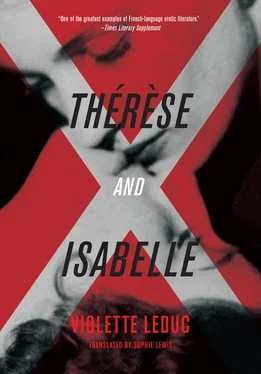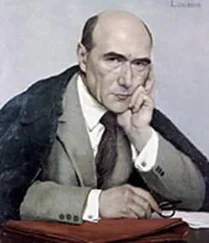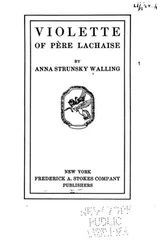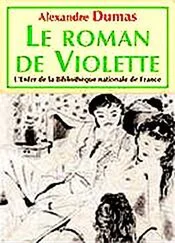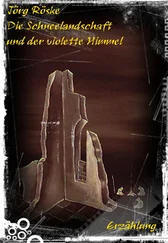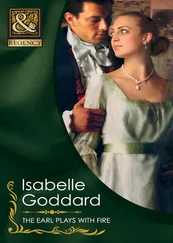“I’m entrusting her to you,” the head monitor said to Isabelle. “You have the letter with the number and the street name. You will find him there. He’s expecting you. Come back with good news, won’t you.”
“Will you permit us a short stroll in town?” Isabelle asked.
“On condition that you don’t take advantage. Don’t run away,” she called.
We had crossed the great courtyard calmly but the flowers, the lawn, the trees had all flown by. The concierge nodded to us.
We walked along the school wall, we heard a piano teacher’s voice, his beating time with the ebony ruler that was always kept by the upright piano.
“Aren’t you happy?”
“We were fine at school.”
We had walked along one wall of Saint Nicholas’s: the priests were teaching, the boys going wild.
“Can we go arm in arm?”
“We ought to keep from doing that,” said Isabelle.
Just as we used to listen for them in the playground, the sounds of the tram and its bell rose up toward school. Soon the girls would hear the hum of the slow local service. Sleepy houses began to give way to shops; the squeal of the tram on its rails lingered out beyond school: we were in town.
Isabelle stopped in front of a display of leatherware. She wanted me to pause with her at this graveyard of black suede things:
“Do you like this stuff?”
“I like, I like. . You know what I like,” said Isabelle.
I was proud to feel as if we were two against the town.
“Will you ever forget me? I never will,” said Isabelle. She was gazing at a paste buckle.
“You will always be alive in me. You will die with me,” I said.
My eyes were closed, I imagined that she was speaking softly to me in the dormitory at night.
I slipped my arm under hers, I molded her gloved hand, I pushed my finger into the lozenge, as far as the hand’s hollow. The idle shop assistant was watching us.
“The headmistress would say that we are comporting ourselves badly. Yes, give me your arm,” said Isabelle.
We walked on, we skipped over the light beyond a church tower. The gentle tone of an ambulance sounded through our exaltation, the rattle of milk churns striking against each other, the driver snoozing at his wheel made me nostalgic for pools of buttercups.
We were running to outrun liberty, we were running alongside the depot’s pinnacles of anthracite; we zigzagged in among the blue glittering, straightened out again near the stacked wedges. I remember the charcoal burner with the stoven-in face whom we puzzled, who vanished inside the depot, I remember his white eyes and the trolley he was pushing with his fingertips.
“What shall we do now?” inquired Isabelle.
“I don’t know.”
“I know,” she said.
“Shall we take a walk? Shall we go to the waiting room? Pick up a railway platform ticket? Have tea in a patisserie?”
She brushed all this away with one hand.
“I know a place,” said Isabelle.
“. .”
“Say something. I know a place for us to go together. Aren’t you pleased?”
We were trotting along beside the stony wall of a factory. Somewhere, a while away, a beam thudded to the ground.
“Let’s go to this hotel,” said Isabelle. “Not exactly a hotel. A house.”
I unlinked my arm from hers.
“You don’t want to?”
“I don’t know what it is.”
“It’s a house where a lady will receive us, a pleasant lady.”
“How do you know that?”
“It’s her business. She will have to be pleasant,” said Isabelle.
We reached a square with an arc of trees pollarded down to stumps.
“Will you decide?”
“I’m afraid to,” I said.
We marched furiously around the amputated trees.
“So? A yes or a no?”
“We were fine at school. .”
“This will be far better than at school,” said Isabelle.
I took her handbag, I carried it alongside my purse, I linked my arm in hers: twining together, our fingers made love.
“Aren’t you hungry? There are some patisseries,” I said, with a faint hope of distracting her from her plan.
“I’ve not been hungry since I met you. There it is. That’s the one.”
“Algazine, Dresses and Coats: is that the place?”
“Ring the bell, go on then, ring it. It’s on your side.”
“I couldn’t bring myself to do it.”
“Allow me,” said a bearded man, “you’ll allow me, since I take it you’ve not yet rung. . Were that the case, however. .”
“Consider it done,” replied Isabelle.
The man raised the felt hat already in his hand; the door opened by itself.
“Ladies first,” said the man.
He stepped aside, his hat still raised. Isabelle gave me a push. I went in first. Perished raincoats hanging from the coat stand there had seen their last rainfall long ago and, below them, gold-topped walking sticks with animal heads carved in wood and silver sheared off on every side like stems in a spray of flowers. The bearded man was wiping his shoes.
“You know your way, of course,” he hinted, in a sybaritic voice quite unlike the way he had spoken outside.
“No!” said Isabelle.
We were standing against the wall, we had the damp of it at our backs while he was trotting about the corridor, hat in hand, briefcase under one arm. He crooked a forefinger, hesitated, then knocked twice on a glass door camouflaged by imitation stained glass.
“But, come in, do come in. .”
The voice emanated from a mountain of goodwill.
He stroked his beard, opened the door.
“I pray you. .”
He was staring at Isabelle’s high-necked blouse.
I was expecting more dressmaker’s mannequins, offcuts of fabric, reels of thread, where instead there were only plants, miniature shrubs, birds, cages.
“I’ll go and look for her,” the man said.
He vanished into a small courtyard that was pleasantly crowded with bulb geraniums, ivies, potted vines, ferns, watering cans, and shelves for the plants.
“Let’s get out!” I said.
“Wait for her,” said Isabelle sharply.
Isabelle was looking at a painting that had orange rocks and waves of blue jam. The birds singing in their cages were making the light sparkle.
“I pray you, please don’t stand up for me,” said the lady. “You must excuse me. I was tending to my duchesses.”
She pointed at the plants with a rope of pearls that hung down to her stomach.
“You mustn’t be noisy when we have company,” she told the birds.
The man with his briefcase and the hat in his hand nodded to us: he left just as he had come.
“He couldn’t find Mademoiselle Paulette. He apologizes,” said the woman, her expression no less coarse.
Despite her great size, her age, her weight, she sprang over to perch on the table.
“I’m at your disposal.”
Isabelle stood up.
“We have come for a room.”
Mme Algazine contemplated us and played with her pearl necklace.
“We should like to hire one for about an hour,” Isabelle said.
A cage suspended from a ring swung to and fro, the bird inside giving little peeps beneath its china cupola.
“I see,” said Mme Algazine.
She tossed her pearls behind her, so they hung down her back.
“You are minors,” she said.
She pranced off into the courtyard. Isabelle ground her teeth. But she was coming back with a tender lettuce leaf, which she poked between the bars of the swinging cage. She headed back into the courtyard just as buoyantly.
I stood up, I called:
“Madame!”
“Right away, my little ones, right away,” she said condescendingly.
“Madame!” said Isabelle resolutely.
She reappeared once more.
“We should like to hire a room, I tell you.”
Читать дальше
